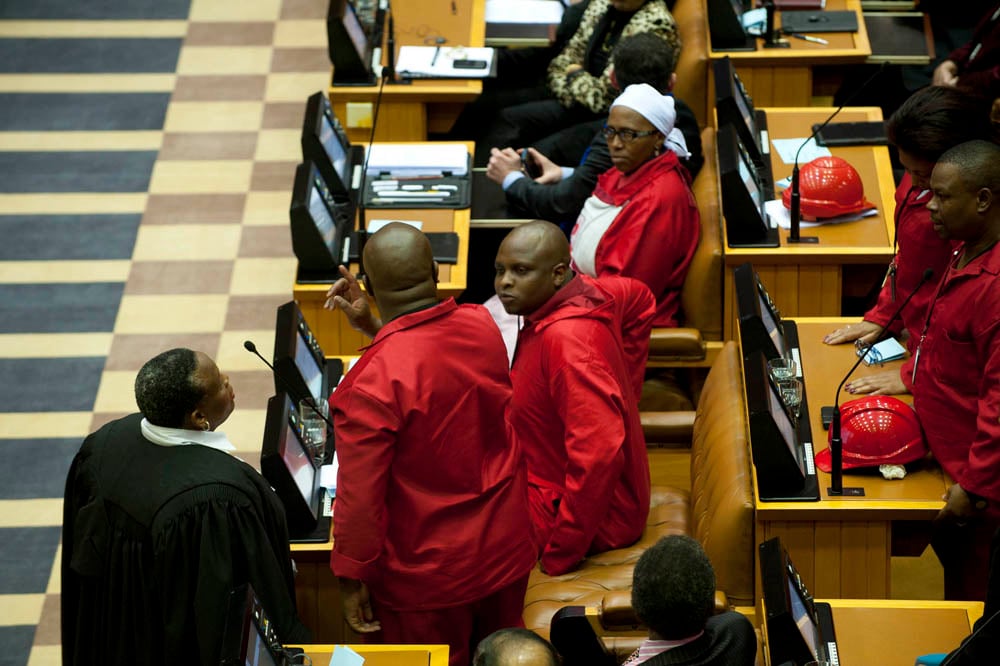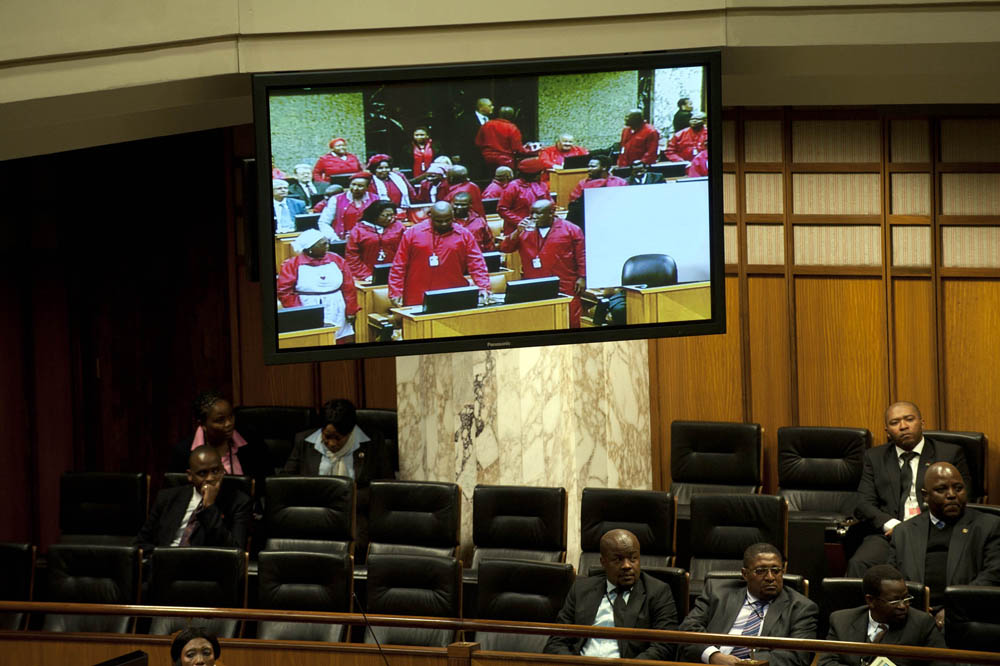?When EFF MPs started chanting “pay back the money”
Security will be the question at the heart of the investigation that Parliament is undertaking following the disruption of a session where President Jacob Zuma was responding to oral questions from MPs on Thursday.
The incident has shone a spotlight on deficiencies in parliamentary rules and procedures, more so on security following the delayed response on Thursday of Parliament’s own security agencies and that of the police. Following the incident, speaker of the National Assembly Baleka Mbete, Democratic Alliance parliamentary leader Mmusi Maimane and ANC MPs have all raised concerns about the security of parliament and its MPs.
“I was worried about how long it took for the sergeant-at-arms to respond because it was eating at the time of the House to go back to its business and to proceed without the members who were no longer interested in sitting through the question time.
“I had to leave the chair myself to go and find the sergeant-at-arms to find out what was taking so long, it became clear that it was not something she could do as an individual and therefore had been looking for others to reinforce her role,” said Mbete.
‘Pay back the money’
When Economic Freedom Fighters (EFF) MPs started chanting: “pay back the money”, Mbete ordered them to leave the National Assembly chamber. They ignored her and continued with their protests from their benches.
Normally, when an MP refuses to leave the house the sergeant-at-arms or Parliament security would immediately escort them out. But it took about 10 minutes before the sergeant-at-arms Regina Mohlomi appeared and approached EFF leader, Julius Malema.

“Those are the areas around which we have to go back as the leadership of Parliament to say: are we adequately resourced for such situations,” said Mbete. She said she had also been concerned about the response of the police and will have to relook how the security of Parliament is managed.
Mbete said the issues that Parliament will relook at includes as to what extent the parliamentary security needs to be reinforced by the police; at what point and under what circumstances. Maimane criticised Mbete saying she acted with haste and unduly summoned the sergeant-at-arms to expel the EFF MPs.
“The sergeant-at-arms’ inability to effectively address the antics within the House today [Thursday] is a cause for great concern,” said Maimane.
Anonymous warnings
Senior ANC member Jackson Mthembu claimed that the ANC had received anonymous warnings earlier on Thursday that the EFF would disrupt the sitting. He said that these were reported to Parliament security structures and relevant structures in the province.
“Why could this chaos not have been averted, maybe it’s a question that could be answers by the relevant security structures.
“We thought they would make a plan to deal with the disruption, but unfortunately it looks like they did not have a plan. It’s something that Parliament must follow up,” he said. Mthembu said this begged a question of how secure are members of Parliament.
Mthembu also warned that the ANC MPs’ patience over EFF antics was growing thin and that he could not guarantee that members of the ANC would be able to contain themselves if a similar incident occurred.
“You would understand that people were very angry, all of us were hot under the collar, but I think we were assisted by the discipline that was taught to us by the ANC over the years,” said Mthembu. “But this discipline is not limitless, unless these matters are attended to expeditiously, indeed we might see scenes that we would not like to see.”
‘Protest is allowed in Parliament‘
Malema has vowed to continue with the protests, saying the EFF was well within its rights to stage a protest. “Protest is allowed in Parliament as freedom of speech is allowed,” he said.

All images by David Harrison
He said it could not be business as usual in Parliament where Zuma “answers Parliament questions like he is answering questions on the streets”. Malema had demanded a meeting with the leader of government business in Parliament, his nemesis, deputy president Cyril Ramaphosa, to discuss “how do we get a Parliament system that holds the executive to account in a more efficient way, not what’s been happening since 1994”.
Parliament has suggested that EFF MPs could be guilty of violating at least three of the National Assembly rules:
- Disregarding the authority of a presiding officer;
- Grave disorder – which forces the presiding officer to suspend the proceedings of the House; and
- The use of offensive or unbecoming language
Mbete apologised to Zuma as a person and to the office of the president for the disruption “because it normally takes us a long time to consult and find appropriate time to get the president to come and account to the house”.
She also apologised to South Africans who were looking forward to hearing Zuma account, she said. “Unfortunately we found members of the EFF not prepared to respect the rules or respect the procedures but to insist on clearly a plan that had been premeditated,” she said.